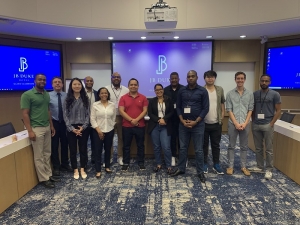The August gathering of the Samuel DuBois Cook Center on Social Equity's Diversity Initiative for Tenure in Economics wrapped up last Thursday amid a flurry of presentations, honors, and enthusiastic discussion.
The program, which provides mentorship and workshops to aid the transition from junior faculty status to associate professor for economists from underrepresented groups, continued on Wednesday with the sharing of in-progress research. In the morning, Kenneth Ford, assistant professor of finance at Wake Forest University, discussed "Influences on Financial Intermediation Breakdowns: Examining Withdrawn Loans," his work centered on trying to determine what causes loan withdrawals (and whether they can be predicted). Elisa Taveras, assistant professor of economics at University of Texas-Rio Grande Valley, then launched into her presentation titled "An Unintended Effect of School Entrance Age: Pushing Children Through Private School," which explored how a child's birth month may make their parents more likely to enroll them in private school, at least initially. In the afternoon, three Cook Center postdoctoral associates took the stage. Will Damron was first, presenting on "Gains from Factory Electrification," his dissertation research that examines the changes that took place in North Carolina manufacturing facilities as they switched to electricity in the late 19th and early 20th centuries. Pak Hung Lam talked about his project, "Locusts Fly, Babies Die: Desert Locusts and Infant Mortality in Sub-Saharan Africa," examining how the agricultural effects of locust plagues may affect child nutrition and mortality, as well as which areas were most susceptible to these effects. Lastly, Aten Zaandam discussed how chief executives respond in times of social crisis in his presentation, "When Greed Gives: CEO Greed and Prosocial Resource Allocation." The evening program, held at the Washington Duke Inn, featured a recognition of the Cook Center's inaugural class of Distinguished Fellows: eight individuals whose research and work, across fields, has demonstrated an extensive passion and tenacity for investigating and understanding the disparities that exist throughout modern society. As Cook Center founding director William A. "Sandy" Darity Jr. said in his remarks, this class of "true mavericks" are perhaps most admirable for their ability to be "quite successful despite their lack of willingness to toe the line."

Distinguished Fellows Al Green, Warren Mosler, and Samuel Myers Jr. flank Cook Center director William A. "Sandy" Darity Jr. (second from left).
Fellows not pictured: James K. Galbraith, Jennifer Lee, Margaret Levi, Jennifer Richeson, and Timothy M. Smeeding.
Thursday morning featured another Cook Center postdoctoral associate, Sungmee Kim, who explored the emerging evidence of differences in learning loss during the COVID-19 pandemic in her talk, titled "Gender Differences in Remote Learning and COVID-19: Disruptive Peers and Self-Control." Following the discussion, DITE fellows and mentors broke off into working sessions for the remainder of the conference. DITE will next convene in the spring, likely in Washington D.C. Photos of this conference, including the evening celebrating the Distinguished Fellows, are available on our Flickr page here.

